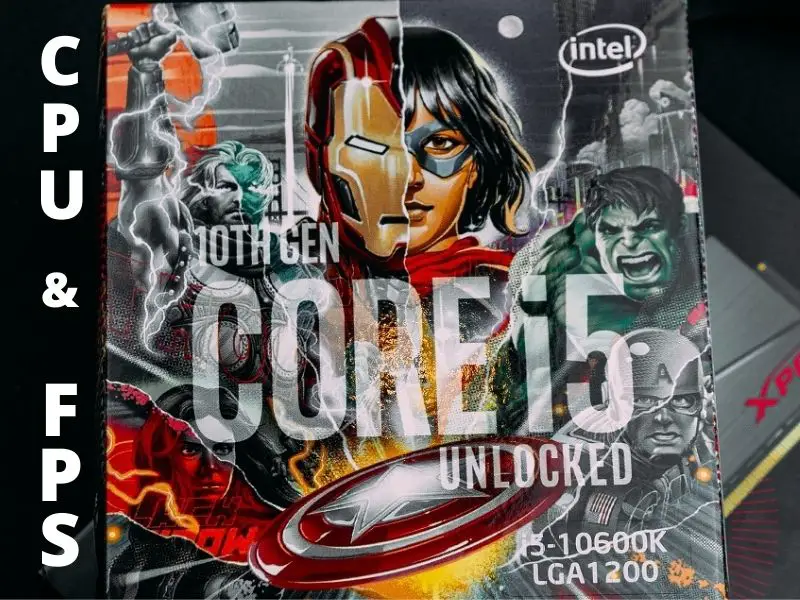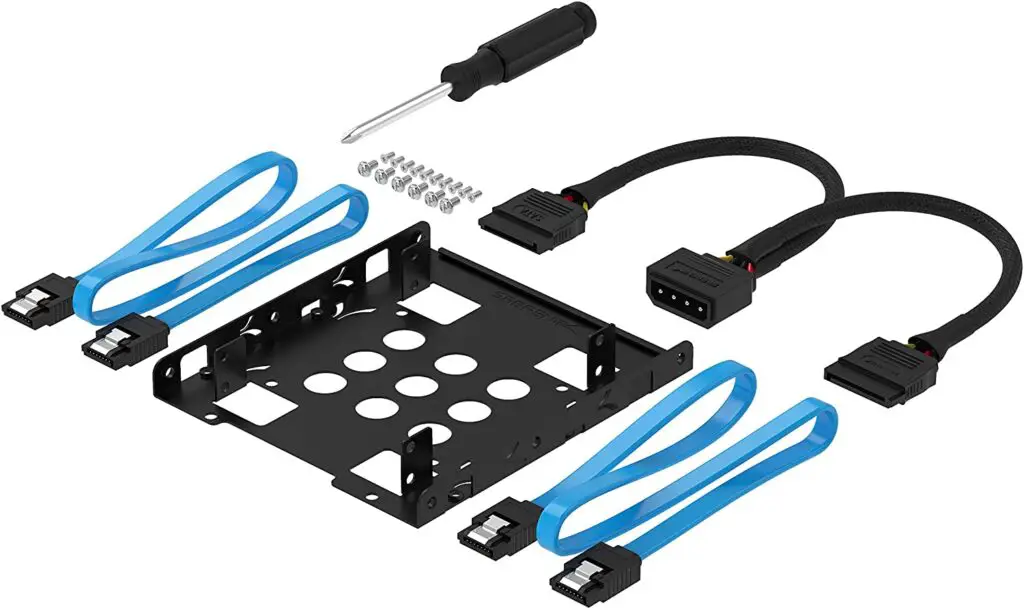When it comes to discussing frame rates, many computer users don’t know or may be uncertain about the role the CPU plays in it.
Here, we’ll discuss some details about the CPU in relation to frame rates to help you understand how it aids the process.
The Facts on Whether CPU Affects FPS
The GPU (Graphics Processing Unit) is the component responsible for rendering images. The CPU, however, is still responsible for processing the instructions that ask for the images to be rendered. Looking at it in this way, we see the CPU plays a part when talking about FPS.
Table of Contents

How Important is CPU For Fps?
Whenever you talk about matters relating to FPS, it’s important to remember it requires both the CPU and GPU.
A GPU is essentially a CPU that has been designed and specialized for image processing. (i.e. The creation and rendering of images on your screen) Its different architecture allows it to do this job faster and more efficiently.
With that in mind, we see that while the GPU ends up carrying most of the load in image processing and eventual FPS output, the CPU still has an important part to play too. It receives and processes the instructions that go into the GPU for image rendering and display.
If the CPU wasn’t present to process this data/information, the GPU would have nothing to render. To have the best FPS experience, these two components should be up to par with each other’s specifications. (i.e. Don’t couple a low-end CPU with a high-end GPU since a bottleneck would occur)
Does CPU Temp Affect Fps?
The CPU has the task of receiving instructions from the user or whatever programs, processing them, and then directs what the GPU should render. This fact implies it has an important role to play in terms of FPS.
With that in mind, let’s take a step back and look at how the CPU is set up in our PCs. They always come coupled with a dedicated cooling unit to help keep its temperature in check.
CPUs work all the time, processing and executing numerous tasks. Performing all these functions makes the CPU generate a considerable amount of heat, ergo the dedicated cooling.
Heat interferes with the efficiency of a CPU since it effectively lowers it. So, yes, if a CPU runs too hot, it won’t perform efficiently, meaning it can’t execute instructions as fast as it should. This can create a bottleneck in the process of image rendering, affecting the FPS rate.
Can a Hot CPU Cause Low Fps?
Heat is a waste product that is created when electrically powered devices are in use. Considering how frequently the CPU is in use in any system, it generates a significant amount of heat.
The fact that heat is being produced means the CPU won’t work as efficiently as it should. The reason being that heat, being a waste product, interferes with the working of the CPU. The interference means it isn’t operating at maximum efficiency, thereby providing less than expected performance.
In this way, we see that with an overheating CPU, the instructions required in the image rendering process at the GPU, will be executed much slower. This bottleneck means that the FPS will be lower due to this effect.
Does CPU Speed Affect Fps?
CPU speed is measured in units called Gigahertz (GHz). This speed describes the clock speed of your CPU, which is the number of cycles it can perform within one second.
(A cycle is when a task goes through fetching, decoding, and eventual execution)
The higher this speed is on your CPU, the faster it can perform and execute instructions compared to other CPUs with a lesser count.
With that in mind, remember the GPU is still mainly responsible for rendering images, and much of the burden of actualizing the desired FPS rests on it. The CPU, however, still has to process and execute the instructions to render the images.
In some more complex programs or games, this aspect becomes crucial. Consider a scenario involving a slow CPU that can’t match the output rate of a fast GPU. That’ll be effectively creating a system bottleneck. (Since the GPU output will be faster than the CPUs ability to process instructions for the next images to be rendered). Here, lower FPS will be experienced.
Coupling a powerful GPU with an equally fast and powerful CPU is the best way to achieve maximum FPS.
Does CPU Cooler Affect Fps?
The CPU cooler is responsible for dissipating heat away from the CPU as it is in use. The CPU generates heat while in use. Depending on the task in execution, the amount of heat could be higher than usual.
When a CPU gets too hot, it won’t sustain working efficiently, and a performance drop will be observed. Considering the task at hand, a decrease in CPU performance could result in the job being impossible to complete.
In order to avoid such a scenario, a working CPU cooler is a must-have at all times. It should be well maintained so as to afford the best cooling possible for the CPU. This in turn would allow the CPU to perform efficiently and not slow down the FPS production process.
Can a Better CPU Cooler Increase Fps?
The frame rate (FPS) is mainly down to two components; the CPU and the GPU. The CPU handles processing and executing instructions that direct the GPU to render and display the images.
When discussing FPS processing, it comes down to the specifications of the CPU and the GPU. The specifications of these two components are already defined (i.e. can’t be altered). It would, therefore, be impossible to say that a better cooler could solely increase the FPS of a system.
That said, however, the cooler is part of the CPU. It is a critical component of the CPU since it’s responsible for dissipating heat from the CPU. Overheating would interfere with the typical and efficient working of a CPU.
A CPU cooler is therefore integral in maintaining an optimum working temperature for the CPU so that it can always process rendering instructions efficiently.
Does CPU Usage Affect Fps?
The CPU is a finite resource on your PC. What this fact implies is that tasks have to share this limited resource.
To get this point better, think of the CPU as a pizza, sliced into eight equal parts. The pizza represents the entirety of the CPU’s resources.
In order for some tasks to be executed, they may require just a single slice of this pizza. As the complexity of a task increases, more slices may be needed. The sheer number of tasks in execution at any point in time could also affect the availability of slices. (More tasks mean that there are fewer slices available for other tasks)
With that in mind, assume FPS processing requires four slices. The process would then be slowed down if, at the moment of initiating the process, only one or two slices are available. In this way, we can see how CPU usage can become an impediment to FPS processing.
Will Overclocking CPU Increase Fps?
Overclocking is the practice of making a CPU run at speeds higher than it was originally intended for. Used moderately, it proves to be a handy feature.
At typical speeds, the CPU can handle a specified number of cycles (i.e. instructions). With the overclocking feature enabled, more instructions can be handled within the same time frame.
Applying this logic to FPS production, we realize that overclocking a CPU can indeed increase the FPS. Assuming at usual speeds a CPU can’t keep up with the rate at which the GPU is rendering the images, overclocking would become a natural solution.
An overclocked CPU would have the ability to handle more instructions, which would improve the rate of FPS production.
Can a Bad CPU Cause Low Fps
A CPU can go bad in several different ways. From having damaged internal components, experiencing overheating, to a full-on failure from an electrical surge.
When thinking about it in relation to FPS, it implies the CPU is functioning, just not at maximum capacity. Though this situation is better than a dead CPU, it’s still a situation that demands immediate remedy.
The reason being that a CPU not working at 100% capacity is inefficient. This means that tasks will often take longer to complete than usual. In the case of FPS production, this would result in laggy or choppy FPS rates.
Will a Better CPU Improve Fps?
A better CPU means an upgrade in speed, performance, and durability. In relation to FPS production, a CPU upgrade would be a welcome affair. Focusing on just one aspect of an improved CPU, increased speed, we can see why.
FPS relies on both the CPU and GPU for actualization. The CPU gives the GPU instructions on what images to render and how to render them. The GPU then renders the images and displays them to your screen.
With a better CPU, these instructions can be fed to the GPU much faster, leading to an improved FPS experience.
How to Check CPU Fps?
The CPU doesn’t have an FPS count.
Finding out the FPS of whatever game or program you’re using is, however, possible in various ways. They are:
- Accessing the settings and readings from toolbars inside the program or game in use.
- Using 3rd party applications specially designed to monitor FPS. (E.g. MSI Afterburner, FRAPS, FPS monitor)




